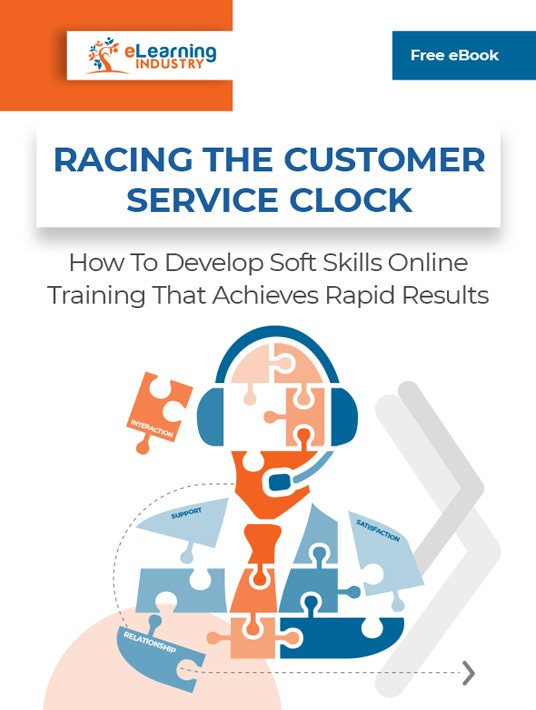Which Soft Skills Online Training Modules You Should Include In Your Extended Enterprise
External partners often get overlooked in skills-based online training. They aren't around to show off their strengths or reveal their gaps, which makes it exceedingly difficult to know which resources they need to get the job done. However, there are a few core competencies that every partner must possess to improve performance and accurately represent your brand. Namely, soft skills that allow them to articulate their thoughts, solve common problems and persuade clients to seal the deal. No extended enterprise program is complete without these 8 soft skills online training modules.

1. Negotiation
External partners must have strong negotiation skills to persuade clients to purchase products and appease their worries. It's also about reaching a number that both parties agree upon without violating any company rules. Making the client feel like they got a great deal without digging into the profit margins. It's a balancing act. So, your extended enterprise online training course should cover all the nuances via immersive simulations and video demos.
2. Nonverbal Communication
Sometimes the most critical parts of the discussion are facial expressions and body language. Not what the customer/client says but how they react and behave during the interaction with your remote sales team. Partners must understand how to decipher these nonverbal cues to improve customer satisfaction. For example, the client rolls their eyes or yawns during the sales pitch. This is probably a sign that your sales employee needs to work on their approach—or bring coffee to the next meeting.
3. Problem Solving
Remote partners don't usually have the luxury of turning to a co-worker or asking their manager a question. They're flying solo. Which means they must navigate challenges on their own. This requires a high degree of problem-solving skills to assess every aspect of the situation and find the best approach. Even if that solution involves some unconventional methods that may be more involved than others. They should also be able to evaluate all the risks and choose a path that's most beneficial for customers and the company's bottom line.
4. Resourcefulness
Your extended enterprise team needs to work with the tools and information they have. Which often requires a think-outside-the-box approach and strong resourcefulness skills. For example, they know how to use their talents in different contexts and where to go for relevant information. Resourcefulness also applies to their online training paths. There may not be a product demo or tutorial for the item they're pitching. However, there are tie-in activities or support tools they can use to fill in the gaps before the client meeting.
5. Conflict Resolution
Conflicts can arise in the most unlikely places. During a sales pitch or when collaborating with other remote employees. Thus, external partners must be equipped with conflict resolution skills to deescalate the situation. As well as avoid potential arguments that tarnish the company's reputation or their own professionalism. They should also be able to diffuse conflicts between co-workers or team members when necessary.
6. Adaptability
Every member of your organization needs to adapt to changing circumstances, policies, and tasks. Particularly remote sales teams and call center staff who must think on their toes and be ready for any challenge. After all, they're out in the field. Adaptability also allows them to evolve and expand their experience constantly. Instead of remaining stagnant and falling into a routine. It's natural to fear change. However, external partners must be able to rise to the occasion and look at change as growth opportunities. A chance to broaden their horizons and test their knowledge.
7. Creativity
When one thinks of creativity, visual arts and prose writing usually spring to mind. But it's also a crucial topic for soft skills online training modules. External partners need to look at all aspects of the situation or challenge. To use their creativity to think of new ways to pitch products or meet clients' expectations. As well as make the most of their time. For example, devise innovative ways to maximize productivity or bridge performance gaps. One of the best online training tools for creativity building is brainstorming sessions. Launch a social media group or discussion forum where partners share ideas and discuss hot topics.
8. Decision Making
Remote workers have to make difficult decisions without outside intervention or assistance. Which also means they have to deal with the repercussions. Thus, decision making is another soft skill to cover in extended enterprise online training modules. Simulations, scenarios, and serious games are all wise choices. The key is to mimic real-world pressures so that employees know how to cope with stress. For instance, they need to finish the activity before the clock runs out. Which involves a series of tough decisions with extenuating circumstances. Nothing is cut and dry. There are numerous factors they must consider to achieve the desired outcome. They'll have to do the same in the real world, and these activities prep them for the challenge.
Certain soft skills are more challenging to teach. For example, some people are born with higher levels of empathy and compassion. They're the ones people turn to during their time of need, even if they happen to be total strangers. While others must work hard to cultivate these abilities in online training. So, survey your team to identify the weak areas and create a personalized strategy for external partners. Don't just consider their pain points. Evaluate their personality traits, goals, and job duties to determine which resources are worth adding to your extended enterprise curriculum.
If you need to learn more about the importance of honing soft skills in the workplace, read our eBook Racing The Customer Service Clock: How To Develop Soft Skills Online Training That Achieves Rapid Results and find out all the benefits of investing in your employees' soft skills training.






